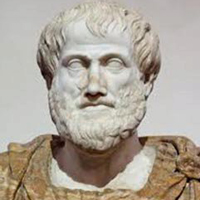Aristotelian Concept of Plot
Aristotle defines plot as the soul of tragedy and gives much emphasis to it. It is said to have "unity of action" (to be an artistic whole). The order of unified plot, Aristotle points out, is a continuous sequence of beginning, middle and end.

Aristotle (384-322 BC)
The beginning initiates a main action in a way which makes it look forward to something more, the middle presumes what has gone before and requires something to follow; and the end flows from what has gone before but requires nothing more; we are satisfied that the plot is complete. To put it in other words, the beginning sets an action in motion and in the middle it gets complicated and at the end all the complication related to the action is resolved.
Aristotle says that being an imitation of an action, plot should imitate one action (unity of action). It is an artistic whole that is directed towards achieving intended effects, that is, catharsis of pity and fear. None of the important parts or incidents is non-functional; all the parts are so closely connected that the transposal or withdrawal of any one of them will disjoint and dislocate the whole. Presentation of a series of episodes simply because they happen to a single character does not constitute a unified whole.
The plot evokes tragic pity and fear during its movement from complication to catastrophic resolution. Aristotle uses this distinctive effect of plot to distinguish tragic plot from other plots, like comic and satiric, and he regards it a determining principle in the organization of plot. The hamartia of the protagonist leads to the complication in a plot and a sudden revelation of that flaw, or anagnorisis intensifies the complication. This revelation reverses the protagonist's fortunate fate into an unfortunate one, known as Peripeteia that ultimately leads to catastrophe or a tragic end of the life of the hero. This shows that Aristotle clearly favors complex plot as opposed to the simple plot in which reversal of the situation is almost impossible.
